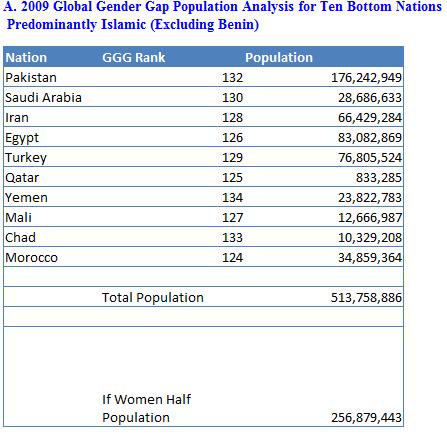"The 2009 report by the World Economic Forum has listed predominantly Islamic nations in the bottom of their annual Global Gender Gap (GGG) Index. This included such major nations as Pakistan (ranked 132 out of 134), Saudi Arabia (ranked 130 out of 134), Iran (ranked 128 out of 134), Egypt (ranked 126 out of 134), and Turkey (ranked 129 out 134). Yemen, which is 99 percent Islamic, was the bottom ranked nation as 134 on the Global Gender Gap Index. The only nation not predominantly Islamic in the bottom of the Global Gender Gap index was Benin.
In addition, the 2009 World Economic Forum Global Gender Gap Index report does not include rankings on a number of significant and predominantly Islamic nations where women are oppressed. Somalia (population of nearly 10 million) was not included in the index. Endless numbers of reports of the stonings and Islamic supremacist abuses of women have been reported in Somalia in the past year, including the stoning to death of a 13 year old girl based on “Sharia law” in October 2008. Sudan (population of nearly 41 million) was also not included in the World Economic Forum Global Gender Gap Index. Among other nations, Afghanistan (29 million) and Iraq (29 million) are also not included in this Global Gender Gap Index. With the index not reporting on these 109 million, the desperate fate of an estimated 50 plus million women are not included in this Global Gender Gap index report.
Even with these significant exclusions from the Global Gender Gap index report, the bottom 10 index nations (excluding Benin), which are all predominantly Islamic nations, represent a population of over half a billion individuals. These include Yemen (134 out of 134), Chad (133), Pakistan (132), Saudi Arabia (130), Turkey (129), Iran (128), Mali (127), Egypt (126), Qatar (125), Morocco (124). If women represent half of the population in these nations, then these bottom 10 predominantly Islamic nations demonstrate the ongoing oppression of an estimated 250 million women.
In addition, if some other predominantly Islamic nations in the bottom of the Global Gender Gap index are also added to these totals, the global image of the correlated oppression of women further expands dramatically. (Again, this is without such nations as Somalia, Sudan, Afghanistan, Iraq, etc., which were not included in the GGG index report analysis.)"
Continue reading here













